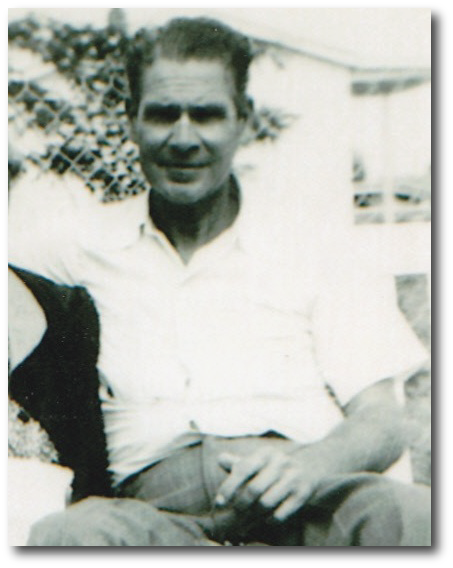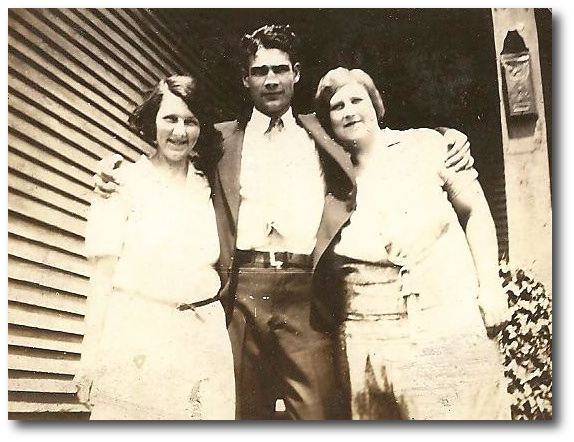 John at 49 in 1957, ten years before he died. I never knew my paternal grandfather. He died five months before I was born.
John at 49 in 1957, ten years before he died. I never knew my paternal grandfather. He died five months before I was born.
John William Richard Mansfield (one of many variations of his name) died during the first week of July (we don’t know the exact day) in 1967. Estranged from the family, he died alone in Memphis, Tennessee, as a result--according to his death certificate--of septicemia.
If you’re not familiar with septicemia, I’ll save you the bother of looking it up: it’s blood poisoning. My grandfather, John, had two conflicting maladies; he was both diabetic and alcoholic. The two do not go well together because consumed alcohol converts to sugar in the digestive system. Moreover, John was not one to faithfully take his insulin injections.
About a week before he died, my father’s older half-brother, Johnnie, paid his father a visit. John had a wound on one of his legs that looked badly infected. Actually, it was gangrenous. Johnnie told his father that he need to go to the doctor, but John wouldn’t go. He knew they would remove his leg, and he felt that he just couldn’t live as an amputee. Very true, but I'm sure not as he meant it.
I’ve heard hushed stories about my grandfather, John Mansfield, all my life. As I said, I never knew him. I also heard that I had aunts and uncles I’d never met--as well as cousins--all from a marriage my grandfather had to a woman who was not my grandmother.
My grandfather was born on March 17, 1908, somewhere in Kentucky (we’re not certain exactly where). His parents were William P. Mansfield (born Nov 4, 1880) and Daisy Dean Julian (born sometime in August, 1882). There was also a sister, Mary Elizabeth, about a year older than John, whom the surviving family knew as “Aunt Beth.” I’d never heard of any of them except for John until a few months ago.
Frankly, John Mansfield was not an overly responsible individual (and that’s being very kind). In 1931, he married Ena Prier, and they had four children--two boys and two girls. But sometime around 1938, John started seeing Maurene (yes, that spelling is correct) Fowler, my grandmother, in Little Rock, Arkansas. When Maurene found out John was married, she broke things off with him. She told him she was not the kind of woman who would date a married man.
Maurene was nearly 30 years old when she had started seeing John. I have very distinct memories of my grandmother, but they all come about three decades after these events and beyond. When I remember her, she’s at near saint-level in my mind. She was a pillar of her church when I knew her. I’m sure she could have told you her sins, but I couldn’t tell you what they were. I never saw them.
Therefore it’s hard to imagine a man like John being willing to leave a wife and four children for my grandmother. And even after he came calling again in 1939, with the ink still fresh on the papers of his divorce from Ena, it boggles my mind that Maurene would have anything to do with him. Perhaps it was her age. I have no idea how many suitors had come calling in her younger days, but I’m sure that by the age of 31, the number had drastically dwindled.
And yet history has a funny way of repeating itself. In late 1939, John and Maurene got married. After they had three children, one of whom is my father, John simply disappeared one day. I believe it was around 1947, but I could be off a year or two. By the time he came back about half a decade later, begging Maurene to take him back, she simply wouldn’t hear of it. She’d worked three jobs at times to support herself and three children. Maurene was college educated (a rarity for women in those days) which allowed her to teach elementary school, but an Arkansas teacher’s salary in the 1940s and 50s was not enough to make ends meet.
 The charismatic John Mansfield at 20 (1928). On the left, a family friend, Aubrey; and on the right, John's sister, Beth.I don’t blame my grandmother for not taking my grandfather back. I have no doubt she probably loved him even years later. From everything I can tell, he was an extremely charismatic individual. But his increased drinking had brought chaos into her life years before, and now she had to think of what would bring the greatest stability for her three children. John and Maurene never divorced, but they would never live in the same house again either. John moved to Memphis where much of his family from his first marriage lived.
The charismatic John Mansfield at 20 (1928). On the left, a family friend, Aubrey; and on the right, John's sister, Beth.I don’t blame my grandmother for not taking my grandfather back. I have no doubt she probably loved him even years later. From everything I can tell, he was an extremely charismatic individual. But his increased drinking had brought chaos into her life years before, and now she had to think of what would bring the greatest stability for her three children. John and Maurene never divorced, but they would never live in the same house again either. John moved to Memphis where much of his family from his first marriage lived.
In spite of John’s faults, there were some positives. My father tells me how smart his father was. And this information comes not from his own memory, but from the testimony of his mother, Maurene. She said there wasn’t anything mechanical that he couldn’t figure out. He could take any device apart, fix it, and put it back together again. My grandmother told my father that she really believes he could have been something more if it weren’t for the fact that he had to drop out of school after about the fifth grade to help support the family.
Also, I’ve recently met some of my “half” first cousins--that is, grandchildren of John and his first wife, Ena--who are a bit older than me and remember him. Although John’s wives and children had great reason to be wary of him, his grandchildren who knew him seem to have fond memories of their brief experiences with him. They describe John as kind and funny, even if he did tend to always smell a bit like tobacco and whiskey. One of my cousins told me that she really liked her grandfather, but her father didn't let him come around much.
It’s easy to judge my grandfather harshly. Certainly no one can excuse the abandonment of not one, but two separate families. But where did John’s life first take a turn for the worse?
No one living now seemed to know the exact circumstances that led to my grandfather’s disadvantaged childhood, vaguely described years ago by my grandmother. As I began digging into the past, I discovered a family scandal that is not only shocking to me--even weeks after I first discovered it--but still sounds like something more the stuff of fiction than real life. Nevertheless, I have the historical records and newspaper reports that prove what happened on the night of April 7, 1920.
I’ll provide the jaw-dropping account of those events in my next installment.
Part 2: A Shooting in Phillips County
Part 4: Confronting the Abhorrent Truth
Part 5: Prison Before Dishonor
As always, your questions, thoughts, comments or rebuttals are always welcome below.